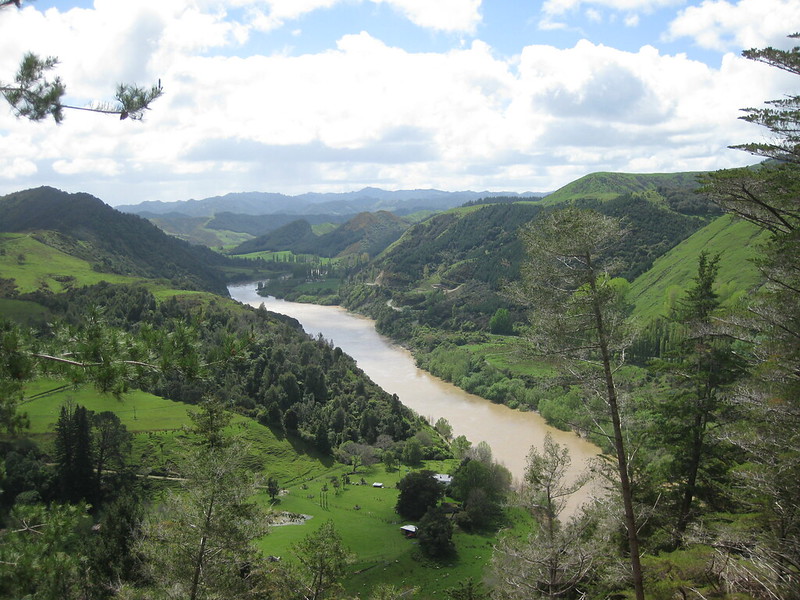
Whanganui River – Felix Engelhardt, CC BY 2.0 DEED
Corporations are people, my friend. Or, at least, they are under the legal regime that prevails under capitalism. So why can’t a river be a person? Or a forest? Or a mountain?
To those of us steeped in Cartesian dualism, it sounds like a bizarre idea. However, there’s precedent for it in the cultures and belief systems of indigenous people around the world.
For example, Native American languages like Potawatomi draw little distinction between what English speakers would consider animate versus inanimate objects. They treat everything as alive and aware in its own way. Some Western legal scholars, like Christopher Stone and Supreme Court Justice William O. Douglas, advocated a similar theory.
And in the last few years, a handful of countries are warming to the idea. In 2014, New Zealand passed a law that granted legal personhood to Te Urewera, a rainforest and national park. In 2019, they followed up by granting personhood to the Whanganui River, which is sacred to the Maori people:
When the New Zealand parliament passed the Te Awa Tupua Act granting the Whanganui River system legal personhood, the decision sent waves across the globe, settling the longest water dispute in the nation’s history and establishing a unique legal framework rooted in the Maori worldview of the Whanganui tribes, who revere the river as a tupuna, or ancestor.
The law begins by recognising the river as an indivisible and living being called Te Awa Tupua and outlines four core principles from the tribes’ perspective, including their inalienable connection to the river. Then, it states this being “has all the rights, powers, duties and liabilities of a legal person”.
The idea has also spread to India, where in 2017 a court ordered the granting of legal personhood to the Ganges and Yamuna Rivers.
Because our legal system privileges human interests above other beings, 20th-century environmentalists argued for preservation on the grounds that nature gives us aesthetic pleasure. It’s understandable why they made this argument, but from a moral perspective it’s backwards. It assumes wilderness has no value of its own. Nature is only permitted to exist insofar as it serves the desires of human beings. The ideology of capitalism treats everything as valueless, unless it proves otherwise by making a profit.
Even by this narrow accounting, nature should be worth more than the value of tourist dollars. We depend on the natural world for our existence, not vice versa. It gives us the air we breathe, the water we drink, the fertile soil where we grow our food, the oceans we fish, the insects that pollinate our crops.
However, more fundamentally, we lose something precious when a beautiful wild place falls to the bulldozers. Each species is unique and irreplaceable, the distilled result of millions of years of evolution, no more and no less than human beings. It’s obscene to say that nature should only be allowed to exist if we can put a dollar value on it. Its right to exist should be the default. It’s destruction that should require a justification, not preservation.
It’s this reasoning that undergirds nature-as-person arguments. Obviously, a river or a forest can’t speak for itself or express its desires. But that’s not necessarily a problem. Our legal system already has ways of extending honorary personhood to all kinds of entities. A corporation has shareholders who make decisions on its behalf. A small child or a disabled person who can’t communicate can have an appointed guardian who speaks for them and watches out for their interests. We could imagine doing something similar for nature.
Of course, the wrinkle is that personhood brings both rights and responsibilities. A wild animal isn’t a person, so it doesn’t have rights, but it also isn’t treated as responsible for any harm it commits. We understand that it’s obeying its nature and can’t be expected to do otherwise. (Notwithstanding the fact that medieval Europeans put animals on trial for misdeeds.)
How would it work to grant personhood to a natural feature like a river? Is it a violation of a river’s rights to dam it for electricity, or to divert its water for irrigation? Does the river “mind”? And what if the river bursts its banks and destroys a town, or drowns a person? Can the river be sued for the harm it’s done?
Some commenters treat the issue of liability as a joke, but I think it’s a serious question. This is where the legal analogy of personhood starts breaking down. A corporation’s executives actually have control over what the corporation does, and they can be held responsible for harmful decisions they make on its behalf. A river’s guardian doesn’t.
For those reasons, I’m not convinced that personhood for nature is the right fit. But I do like the idea of granting nature enforceable rights of its own. It should have the freedom to exist, as far as is practical, free of degradation and encroachment. There could be guardians whose role it is to maintain the health of a river or a forest, protecting it from pollution and other harms.
This is the approach taken by Ecuador, for example, which added a “rights of nature” amendment to its constitution. Bolivia has done the same with its Law of Mother Earth. This strikes me as the right approach, and we can hope more nations adopt it.
It doesn’t mean an end to all new development or all use of natural resources for human benefit. But it does require something that’s almost never done right now: a careful analysis of the harms and benefits, rather than an implicit assumption that nature is worthless and rapacious destruction in the name of profit is always a good thing.

Sorry to be facetious, but I await someone drowning and the river being put in prison for negligent homicide. X-D
Silentbob: exactly.
In a similar vein:
Robert Reich, “The Corporate Pledge of Allegiance”